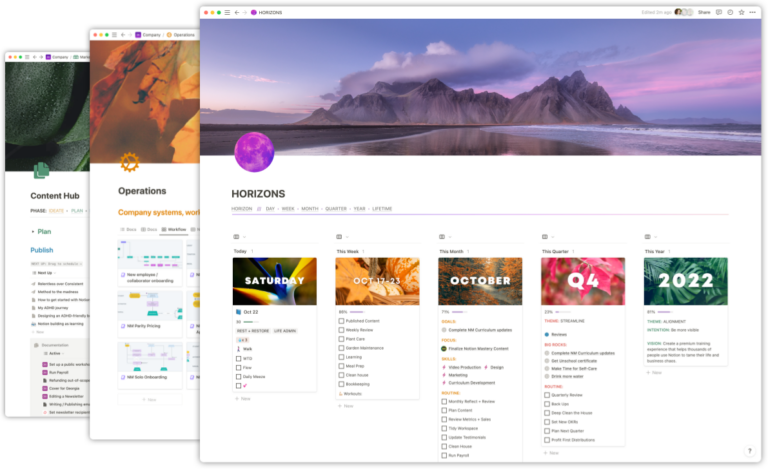Does one (or many) of the following describe you?
- Someone told you how amazing *Notion is or how it’s completely revolutionized their business.
- You’ve poked around with Asana, Basecamp, et al, or you’re managing your team with a combination of email, spreadsheets, and intractably organized Google Drive documents (it’s okay, we’ve been there too).
- You checked out *Notion and thought “Damn, I could save a lot of money if I could use one tool instead of [gestures wildly at a growing stable of SaaS products]…”

These and others are what we’ve heard consistently from business owners and other c-suite roles as reasons why they’re asking us to “help [them] make this decision [on which productivity tool to use]!”
To be sure, Notion is an incredible tool—one that can help organize and craft new operational workflows and document existing ones. You may have even heard how it “replaces” Google Drive, Project and Task management, and spreadsheets.
However, it doesn’t do projects and tasks out of the box, per se.
Notion Lacks Structure (and that’s okay)
You have to build and/or prototype these tools yourself, via a template or just rolling-up-your-sleeves and getting greasy.
We built the Notion Mastery program largely because we wanted to help folks that are committed to taking the latter path and embracing the chaos.
Embracing the chaos
The first heading on Notion’s sales page is “Team up without the chaos”. I’d actually argue that a better heading for Notion is closer to “Embrace the chaos [with your Team]”!
In structured, ordered systems, “next steps” are clear and things get done without much prodding, and that’s important. However, chaos is rife with opportunity—chaos is where innovation lies dormant.
Notion’s open-endedness is both its blessing and (often) its curse. It can be chaotic, and you might want to allow it to be. Notion allows you to start capturing data in pretty much any way you like. You might have a chaotic system to start, and, through building more rigid hierarchies on top or alongside the chaos, patterns emerge and strategies evolve. By embracing, allowing, and perhaps, yes, even encouraging a bit of chaos, interesting and often lucrative opportunities can emerge.
Businesses that succeed with Notion are:
- highly adaptive
- have employees that value autonomy and play
- want more than just “simple systems” for managing projects
- are comfortable getting uncomfortable
Businesses that thrive in the liminal space between chaos and clarity will be right at home in Notion. You as a founder (and your employees) will need to be somewhat comfortable with a bit of wild, unbridled product development. Your workspace will cyclically move from chaos to complicated, and—as your Notion skills improve—to ordered.
In short, don’t expect Notion to simplify and/or make your operations structured and ordered in the immediate.
Not comfortable getting uncomfortable?
You may want to consider a more structured project management-focused software like Asana, Clickup, or (one that I’ve been playing with lately) Taskade. You can still use Notion for your more creative and strategic efforts such as:
- OKR design
- Handbooks
- Writing and shaping documents
- Custom support docs
As we often remind even professional Notion template creators:
Just because you can build it in Notion, doesn’t mean you should.
It’s okay to use other apps. We won’t tell.
In fact, Notion’s recent addition of Link Previews mean you can embed content from apps like Asana right in Notion, thus getting the best of both worlds.
Notion is what I like to think of as a strategic canvas. It allows you to build data-sets and systems that work the way your business does and the way that your best thinkers strategize.
If you are looking for project management tools that “get out of your way” and allow you to “get work done”, Notion might not be the right tool-set to run your whole business, but it can certainly be a fantastic tool to enrich your business.
[*For full disclosure, I’m a Notion Partner, so when you sign up with my link, you also help support me and my content!]

 Notion tips in your inbox
Notion tips in your inbox